| Overview |
|
JSS medical research inc. June 7, 2003
Abstract
Neptune Krill Oil was tested on a group 120 patients with mild to high hyperlipidemia (high cholesterol). In a multi-clinical, 3-month, prospective, randomized study, the patients were randomly assigned to 4 groups: Neptune Krill Oil 2-3 gm/day (based on BMI), 1.5-1.0 gm/day (based on BMI), an active control group taking 3.0 gm/day fish oil, and a placebo group.
Primary parameters tested were: total cholesterol, triglycerides, HDL and LDL cholesterol, and Cholesterol/HDL ratio.
The results of the present study demonstrate within high levels of confidence that:
|
| |
 |
NKOâ„¢ is effective for the management of hyperlipidemia by significantly reducing total cholesterol, LDL and triglycerides and increasing HDL levels. |
 |
NKOâ„¢ 1.5 gr/day is more effective than Fish Oil 3.0 gr/day for the management of hyperlipidemia by significantly reducing LDL levels. |
 |
At equal doses, NKOâ„¢ 3.0 gr/day is more effective than Fish Oil 3.0 gr/day for the management of hyperlipidemia by significantly reducing triglycerides and LDL levels. | |
| |
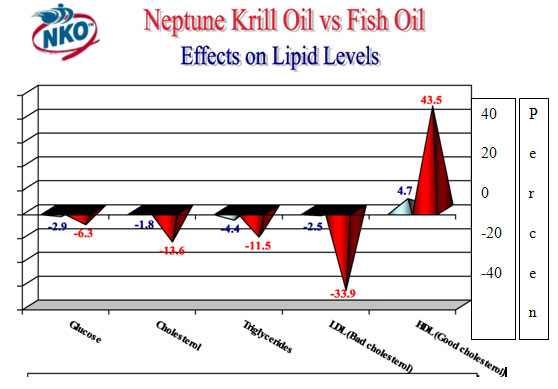 |
| |
| Study Description |
| |
| INDICATION: Blood lipid Lowering. |
| |
| OBJECTIVES: To assess the effects of Neptune Krill Oil (NKOâ„¢) on total cholesterol, triglycerides, LDL, HDL and cholesterol/HDL ratio. |
| PATIENT POPULATION: Patients with hyperlipidemia who can maintain a healthy diet with: |
 |
mildly high cholesterol level: between 5 to 6.4mmol/l. |
 |
moderately high cholesterol level: between 6.5 to 7.8mmol/l. |
 |
very high cholesterol level: 7.8 – 9.0 mmol/l. | |
| |
| STUDY DESIGN: A multi-clinical, 3-month, prospective, randomized study followed by a 3 month controlled follow-up of NKOâ„¢ patients. |
| TREATMENT: Patients were randomly assigned to one of four groups. |
| |
 |
Group A: Neptune Krill Oil (NKOâ„¢) 2-3 gm once daily | |
- BMI <32: 2.0g per day
- BMI >32: 3.0g per day
|
| |
 |
Group B1: Neptune Krill Oil (NKOâ„¢) 1.5-1.0 gm once daily (booster dose) | |
- BMI <32: 1.0g per day
- BMI >32: 1.5g per day
- Group B2: Neptune Krill Oil (NKOâ„¢) 0.5 gm once daily (maintenance dose)
- Group C: active control (18:12 EPA:DHA fish oil) (FO) 3 gm once daily
- Group D: placebo 1.5 gm once daily.
|
| |
| PRIMARY EFFICACY PARAMETER: |
| Primary parameters tested (baseline and 90-day visit).: |
- Cholesterol
- Triglycerides
- LDL Cholesterol
- HDL Cholesterol
- Cholesterol/HDL ratio
|
|
STATISTICAL RATIONALE AND ANALYSIS:
A sample size of 120 patients (30 patients/group) will provide 90% power to detect a 15% change in total cholesterol from baseline to 3 months.
Within group differences reflecting changes over time for the same patient were assessed for statistical significance with the Paired Student’s t-test. Between group differences were assessed with planned comparisons of one way analysis of variance.
|
| |
| Results: |
| MAIN STUDY GROUP ANALYSIS |
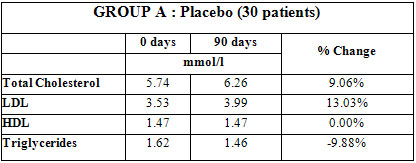 |
| |
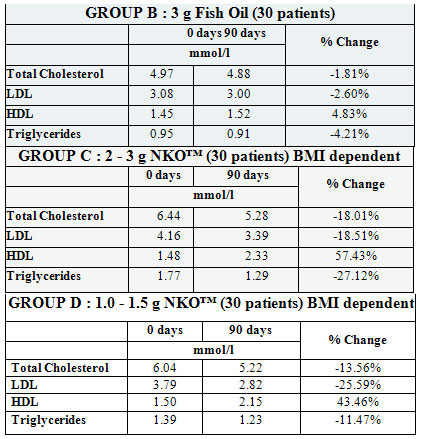 |
| |
| BMI DEPENDENT NKO™™ SUBGROUP ANALYSIS |
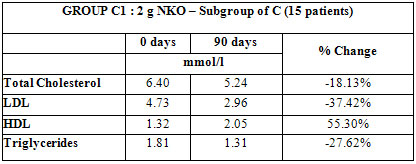 |
| |
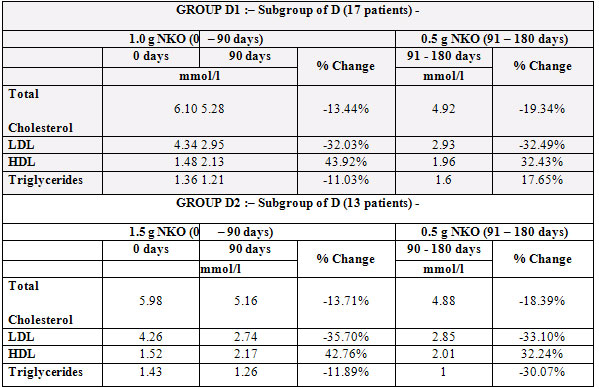 |
| |
| Analysis : |
| The results of the present study indicate that: |
| 1. NKOâ„¢ 1.0 - 1.5 gr/day (BMI dependent) is significantly effective for the reduction of: |
- Glucose
- Total cholesterol
- Low Density Lipoprotein (LDL) and increase of High Density Lipoprotein (HDL)
|
| |
| 2. NKOâ„¢ 2.0 - 3.0 gr/day (BMI dependent) is significantly effective for the reduction of: |
- Glucose
- Total cholesterol
- Triglycerides
- Low Density Lipoprotein (LDL)
- Cholesterol : HDL ratio and increase of High Density Lipoprotein (HDL)
|
| 3. Fish Oil 3.0 gr/day (recommended dose) is significantly effective for the reduction of: |
- Total cholesterol
- Low Density Lipoprotein (LDL)
- Cholesterol : HDL ratio and increase of High Density Lipoprotein (HDL)
|
| 4. NKOâ„¢ 1.0 - 1.5 gr/day (BMI dependent) is significantly more effective than Fish Oil 3.0 gr/day for the reduction of: |
- Glucose
- Low Density Lipoprotein (LDL)
|
| 5. NKOâ„¢ 2.0 - 3.0 gr/day (BMI dependent) is significantly more effective than Fish Oil 3.0 gr/day for the reduction of: |
- Glucose
- Triglycerides
- Low Density Lipoprotein (LDL)
|
| 6. NKOâ„¢ at a maintenance dose of 0.5 gr/day is significantly effective for maintenance within normal ranges of: |
- Glucose
- Total cholesterol
- Triglycerides
- Low Density Lipoprotein (LDL)
- Cholesterol : HDL ratio
- High Density Lipoprotein (HDL)
|
| |
| Recommended Dosage: |
| According to the results of the present study, the recommended dose of Neptune Krill Oil for the management of blood lipids and glucose within normal levels is 1.0¬1.5g/day (BMI dependent) for 30 days (booster dose) and continuing with a maintenance dose of 0.5g/day. |
| |
| Conclusion |
| The results of the present study demonstrate within high levels of confidence that: |
- NKOâ„¢ is effective for the management of hyperlipidemia by significantly reducing total cholesterol, LDL and triglycerides and increasing HDL levels.
- NKOâ„¢ 1.5 gr/day is more effective than Fish Oil 3.0 gr/day for the management of hyperlipidemia by significantly reducing LDL levels.
- At equal doses, NKOâ„¢ 3.0 gr/day is more effective than Fish Oil 3.0 gr/day for the management of hyperlipidemia by significantly reducing triglycerides and LDL levels.
|
| |
| Source: |
Evaluation of the effects of Neptune krill oil on the clinical course of hyperlipidemia
Alternative Medicine Review, Dec, 2004 by Ruxandra Bunea, Khassan El Farrah, Luisa Deutsch
Read the entire study at http://findarticles.com/p/articles/mi_m0FDN/is_4_9/ai_n9485702 |
| |